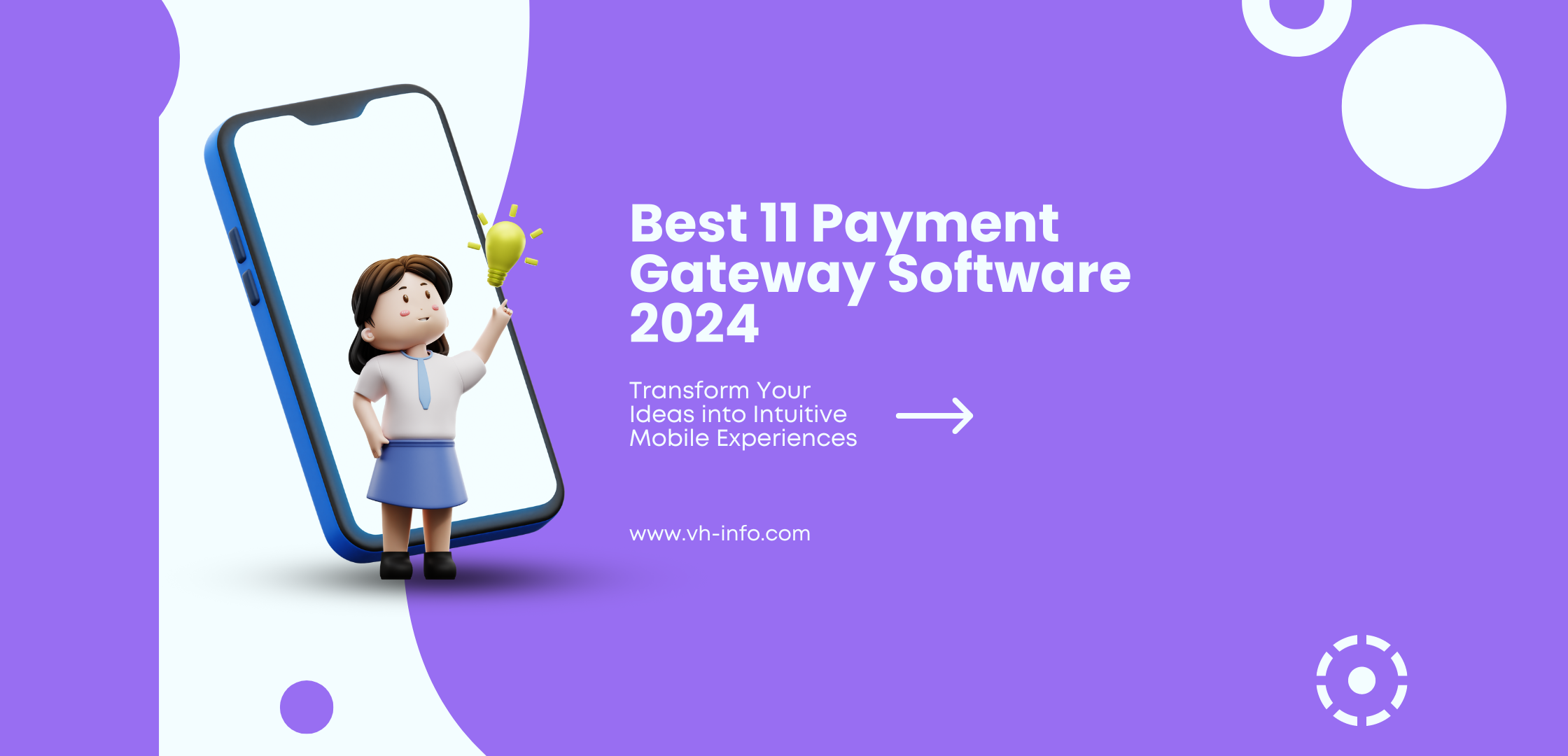Payment gateways have become a crucial component for businesses to accept online payments seamlessly and securely. This guide will explore what a payment gateway is, how it works, and provide an overview of the top 11 payment gateway software options available in 2025.
What is a Payment Gateway?
A payment gateway is a technology that captures and transfers payment data from the customer to the acquiring bank. It acts as an interface between a merchant’s website and the financial institutions involved in the transaction, ensuring that payment information is securely transmitted and processed.
How does the Payment Gateway work?
- Customer Initiates Purchase: The process begins when a customer selects a product or service and proceeds to checkout.
- Encryption: The payment gateway encrypts the transaction details to ensure the information is securely transmitted.
- Authorization Request: The encrypted data is sent to the payment processor, which then requests authorization from the customer’s issuing bank.
- Authorization Response: The issuing bank approves or declines the transaction and sends the response back through the payment processor to the payment gateway.
- Transaction Completion: If approved, the payment gateway notifies the merchant and the customer, finalizing the transaction.
Ecosystem of Payment Gateway
- Merchant
- Payment Gateway
- Payment Processor
- Acquirer and Issuer Bank
- Customer
How to Select the Best Payment Gateway?
- PCI Compliance: The Payment Card Industry Data Security Standard (PCI DSS) is a set of security standards designed to protect card information during and after a financial transaction. It’s crucial to select a payment gateway that is PCI compliant to ensure that your customers’ payment information is secure and that your business adheres to industry standards.
- Emphasis on Security : Security is paramount when dealing with online payments. Look for payment gateways that offer robust security features such as end-to-end encryption, tokenization, and fraud detection tools. If in the firearms industry or in other sensitive niches, make sure you implement a high-risk payment gateway. These measures help protect sensitive data from breaches and fraud.
- Customization Options: Every business has unique needs, and a one-size-fits-all approach may not work. Choose a payment gateway that allows you to customize the checkout process to align with your brand and provide a seamless user experience. This includes options for customizing the payment page, integrating with your existing software, and adding specific features tailored to your business.
- Integration: Ensure that the payment gateway can easily integrate with your existing e-commerce platform, shopping cart, or POS system. Smooth integration minimizes disruptions and ensures a seamless transaction process for your customers. Compatibility with various third-party applications and plugins can enhance functionality and streamline operations.
- Currency Support: If your business operates internationally or plans to expand globally, it’s essential to choose a payment gateway that supports multiple currencies. This feature allows you to accept payments from customers worldwide, reducing barriers to purchase and enhancing the shopping experience for international customers.
- Cost: Evaluate the pricing structure of potential payment gateways. According to Younium, Consider all costs, including setup fees, monthly fees, transaction fees, and any hidden chargesto calculate actual revenue recognised. Some gateways offer flat-rate pricing, while others charge based on transaction volume. Choose a gateway that offers a cost-effective solution for your business’s specific transaction needs.
- Holding Period: The holding period refers to the time it takes for funds from a transaction to be transferred to your bank account. Some payment gateways may have longer holding periods, which can affect your cash flow. Select a gateway that offers a reasonable holding period that aligns with your business’s cash flow requirements.
11 Best Payments Gateway Software to Use in 2024
1. PayPal
PayPal is a globally recognized payment gateway, offering a comprehensive suite of services for online and in-person payments. It supports a variety of payment methods, including credit cards, debit cards, and PayPal balances.
Pros:
- Widely accepted and trusted by consumers worldwide.
- Easy integration with most e-commerce platforms.
- Supports multiple currencies and international payments.
- Strong buyer and seller protection policies.
Cons:
- Higher transaction fees compared to some competitors.
- Account holds and freezes can be problematic for some users.
- Limited customization options for checkout.
2. Square Payment
Square Payment is known for its user-friendly POS systems and online payment solutions. It caters primarily to small and medium-sized businesses.
Pros:
- No monthly fees; only pay per transaction.
- Free POS software with optional hardware.
- Easy setup and integration with various platforms.
- Comprehensive business tools, including inventory management and analytics.
Cons:
- Limited support for international payments.
- Flat-rate pricing may not be ideal for high-volume merchants.
- Customer service can be slow at times.
3. Payment Depot
Payment Depot offers a subscription-based pricing model, providing wholesale rates on payment processing for businesses of all sizes.
Pros:
- Transparent, subscription-based pricing with no hidden fees.
- Lower transaction costs for high-volume businesses.
- Excellent customer service and support.
- No long-term contracts.
Cons:
- Monthly subscription fees can be high for low-volume businesses.
- Limited international payment support.
- Initial setup can be complex for some users.
4. Clover
Clover provides a range of POS hardware and software solutions, making it an ideal choice for retail businesses and restaurants.
Pros:
- Versatile and customizable POS systems.
- Integrated hardware and software solutions.
- Supports various payment methods, including contactless payments.
- Comprehensive app marketplace for added functionality.
Cons:
- Higher upfront costs for hardware.
- Monthly fees for advanced features.
- Can be overkill for very small businesses or online-only merchants.
5. Adyen
Adyen is a global payment company that offers a unified platform for accepting payments online, in-store, and on mobile devices. It supports a wide range of payment methods and currencies.
Pros:
- Supports over 250 payment methods and 150 currencies.
- Unified platform for all payment channels.
- Advanced fraud detection and risk management tools.
- Scalable solution suitable for businesses of all sizes.
Cons:
- Complex setup process.
- Higher fees for small businesses.
- Limited customer support for lower-tier plans.
6. Helcim
Helcim is known for its transparent pricing and robust feature set, making it a popular choice for small to medium-sized businesses.
Pros:
- Transparent, interchange-plus pricing model.
- No monthly fees or hidden charges.
- User-friendly interface with comprehensive reporting tools.
- Supports various payment methods, including ACH and e-checks.
Cons:
- Limited support for high-risk industries.
- Advanced features can be overwhelming for beginners.
- Customer support hours are limited.
7. Stax
Stax (formerly known as Fattmerchant) offers a subscription-based pricing model with no percentage-based transaction fees, ideal for high-volume merchants.
Pros:
- Flat monthly fee with no percentage-based transaction fees.
- Transparent pricing with no hidden costs.
- Comprehensive analytics and reporting tools.
- Supports a variety of payment methods.
Cons:
- Monthly subscription fee can be high for low-volume businesses.
- Limited international payment support.
- Setup process can be complex.
8. Braintree
Braintree, a PayPal service, offers a robust payment gateway with advanced features and support for multiple payment methods, including credit cards, PayPal, and digital wallets.
Pros:
- Supports multiple payment methods and currencies.
- Advanced fraud protection and security features.
- Developer-friendly API for customization.
- Seamless integration with PayPal.
Cons:
- Higher transaction fees for certain payment methods.
- Complex setup process for beginners.
- Customer support can be slow at times.
9. Stripe
Strip e is a popular payment gateway among developers for its powerful API and extensive customization options. It supports a wide range of payment methods and currencies.
Pros:
- Developer-friendly API with extensive documentation.
- Supports over 135 currencies and multiple payment methods.
- Advanced features like subscription billing and invoicing.
- Strong security and fraud prevention tools.
Cons:
- Can be complex to set up for non-developers.
- Higher fees for certain payment methods.
- Limited customer support for lower-tier plans.
10. Paysafe
Paysafe offers a comprehensive suite of payment solutions, including digital wallets, online cash payments, and card processing services.
Pros:
- Supports a wide range of payment methods and currencies.
- Advanced fraud prevention and security features.
- Comprehensive reporting and analytics tools.
- Strong focus on high-risk industries.
Cons:
- Higher transaction fees for certain industries.
- Complex setup process.
- Limited customer support for lower-tier plans.
11. CardX
CardX specializes in credit card surcharging, allowing businesses to pass the processing fee to the customer, which can be a significant cost-saving measure for many merchants.
Pros:
- Reduces payment processing costs by passing fees to customers.
- Transparent pricing with no hidden fees.
- Easy integration with existing payment systems.
- Strong compliance with surcharging regulations.
Cons:
- Surcharging may deter some customers.
- Limited support for international payments.
- Customer service can be slow at times.
FAQs
Q1. Can Payment Gateway work with Multiple Currency?
Yes, many payment gateways support multiple currencies, allowing businesses to cater to an international customer base.
Q2. Are there any transaction limits for payment gateway?
Transaction limits vary by gateway and merchant account. It’s important to review the terms and conditions of the specific gateway provider.
Q3. What are the most used payment method in US
- PayPal
- Stripe
Q4. Which is Better Stripe or Paypal?
Both Stripe and PayPal have their strengths. Stripe is favored for its developer-friendly API and customization, while PayPal is known for its ease of use and widespread acceptance. The best choice depends on your specific business needs.
Q5. Which payment gateway has no monthly fee?
Many gateways, including PayPal and Square, do not charge a monthly fee but may have per-transaction fees. Always compare pricing structures to find the best fit for your business.



